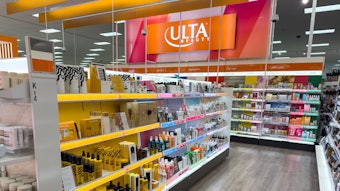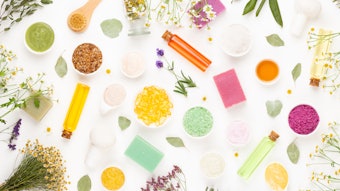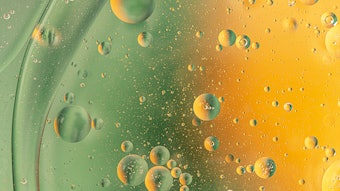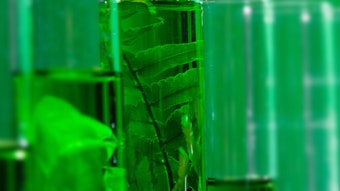In the last decade, Brazil became the top market for fragrance and deodorants, and a top-five leader in the hair care, men’s and children’s personal care, bath products, depilatories, sun care, makeup, nail care, oral care and skin care segments. The country’s status as a beauty and personal care juggernaut is apt, considering its rich biodiversity heritage, which recently intersected with 21st century technology to produce novel fragrance materials and cosmetic actives for global brands.
New Ingredient Production Site
Symrise (Holzminden, Germany), which expanded its presence in Brazil in recent years, has opened a new cosmetic and fragrance ingredient production facility in Belém, Pará, in the Brazilian Amazon. Housed adjacent to a Natura bar soap facility, the site will process local natural materials harvested from among the regional biodiversity by local communities.
Symrise invested more than €5 million in the production plant on an area of 2,000 square meters. The site will process local botanical materials using technology such as the company’s SymTrap cold extraction system to yield oils and butters, as well as fragrance materials.
The site includes an administrative area, production site and analytical lab. Symrise notes that it will bring its existing production in the south of the country north to Belém. Processing is already underway at the new facility and will be expanded out over three phases. Compounding will also take place on the site.
The Symrise facility, housed in a local site called the “Ecoparque,” is the latest expansion in sustainable beauty development in the area and integrates sustainability aspects along the entire value chain, from sourcing and production to the social and economic development of the region. The Ecoparque employs “ecological industrialization” by using geothermal technology for air conditioning and leveraging the site’s garden and lagoon system to filter and treat effluents. The filtration scheme has a water capacity of 130 m3 and ensures that no water waste is sent to municipal facilities. In addition, Symrise repurposes spent biomass for fertilizer.
The company’s São Paulo creative center is constructed with similar values. That site includes 20,000 square meters of forest that is being restored to its natural state.
Building a Sustainable Business During the facility’s opening ceremony, Natura CEO Roberto Lima noted that Symrise was its first Ecoparque partner. Natura has so far invested R$217 million in the Ecoparque, which Lima said will support its efforts toward building a sustainable business. Looking ahead, Lima noted that Natura hopes to generate R$1 billion for local communities through 2020. By 2050, Natura and its partners hope to further grow Amazon-sourced and -produced ingredients and beauty products to bring more value to the region.
Achim Daub, president of Symrise’s Scent & Care division, noted that Symrise’s Amazon program combines science, innovation, local entrepreneurship, and a focus on sustaining the environment and regional cultures. The goal, he said, is to support customers to improve consumers’ lives and increase the cosmetic and fragrance palette with new natural materials derived via green chemistry and CO2 extraction. Finally, the Symrise Ecoparque project will allow it to respond to consumers’ growing interest in knowing more about ingredients and sources.
“At this facility, we intend to bring the richness of the Amazon rain forest to the world’s beauty consumers,” said Daub. “This is an important step to sustainably developing and producing ingredients for cosmetics and fragrances.”
“Symrise appreciates how Natura works in the Ecoparque and thus contributes to regional social and economic improvement,” said Ricardo Omori, president of Scent & Care LatAm at Symrise. “That is why we decided to partner with them on this project. We will learn what fundamental elements are needed for such co-operations and use the insights around the world to combine sustainability and economic success.”
In addition to establishing an ethical sourcing business, Symrise recently donated a medical boat to the local communities to improve access to health care. More than 2,000 families in the area will reportedly benefit from the cultivation and harvest of the Amazonian natural raw materials.
Easing Access to Rich Biodiversity
The Amazon Rainforest spans 2.124 million square miles, primarily in Brazil, Colombia, Peru and the East Andes. Brazil, which comprises the vast majority of the Amazon basin, is reportedly the most biodiverse country on the planet, boasting as many as 56,000 plant species.
The country’s rich biodiversity has already yielded significant numbers of pharmaceuticals. And, now, the beauty and fragrance industries are leveraging these same natural resources to provide new, innovative naturals to global consumers.
The prospects for innovation are high as, according to the Save the Amazon Coalition, less than 1% of these plants have been properly studied by scientists. Yet there are significant threats ahead. In recent decades, the Amazon rainforest has lost about 19% of its total surface area, or 760,000 square kilometers. Industries such as cattle ranching, small- and large-scale agriculture, and logging have made the largest impacts on deforestation. Governments and consumers have taken notice.
“Already more than 80% of consumers expect companies to take action [on] biodiversity and provide more information,” notes a recent report from the Union for Ethical BioTrade (UEBT). “Yet, only 60% of the top 100 food and beverage companies, and 36% of beauty companies mention biodiversity in their annual reporting.” The report adds, “According to UEBT research, consumers start to identify some companies already with respect for biodiversity, for example Natura Cosmetics in Brazil.”
Brazil has historically limited access to biodiversity for industrial R&D purposes, in part to stem deforestation. However, the government recently made changes to its regulations in order to foster innovation around Brazilian natural products while supporting environmental sustainability and the wellbeing of local communities.
In May, Brazil’s President Dilma Rousseff signed PL 7735/2014 into law, effectively easing access to “genetic resources,” providing protection of “traditional knowledge,” and boosting sustainable use of biodiversity and fair distribution of benefits to local communities. The framework encompasses research, development and commercialization of food and cosmetic ingredients derived from the country’s rich biodiversity.
The rules remove a previous authorization requirement for accessing biodiversity for research and development. Now, companies will merely log into an online database to register projects. Meanwhile, a national trust fund will address benefits sharing directly with final product manufacturers to simplify bureaucracies.
Gathering Amazonian Botanicals
In order to “bring the beauty of the region to the world,” as Daub puts it, Symrise works with local communities, including the Jauari Association, to sustainably harvest wild-grown botanicals that are later processed at the new Symrise facility in Belém. (Natura has been working with local communities in a similar fashion for the last seven years.) Locals share in the benefits in an equitable manner.
During a recent visit to the Jauari community and Symrise’s new facility, local experts and the company’s team showed off a number of unique local botanicals:
Açaí (Euterpe oleracea)
Perhaps the most famous of the Amazonian botanicals, the fruit of this palm tree is rich in antioxidants and vitamins, as well as palmitic, stearic, oleic, vaccenic and linoleic acid. It can be applied to shampoos, hair creams, skin moisturizers and soaps.
Andiroba (Carapa guianensis)
The “almond” of the andiroba tree contains oil that comprises olein, palmitine and glycerin. It possesses anti-inflammatory, antibacterial and insect-repellant properties. The oil can be applied to skin and hair moisturizers to impart shine and softness. Symrise has applied andiroba oil in an aftershave for healing and anti-inflammatory effects.
Bacurí (Platonia insignis)
The fruit of this tree can be processed to create a butter that softens skin and reportedly removes spots. According to a paper by Boulanger et al., the fruit contains “linalol and related compounds, linalol furanoxides and pyranoxides, hotrienol and several dimethyl-octadiendiols.” In a fragrance, a SymTrap version of the fruit was applied to a scent dubbed Dima di Noche.
Brazil Nut, or Castanha-do-Pará
The vitamin E-rich oil of the Brazil nut possesses moisturizing and conditioning properties and can be applied to skin and hair care products. Symrise has produced a SymTrap version of this material, which is true to the fruit. The ingredient is in the research phase and is being gradually scaled up.
Buriti (Mauritia flexuosa)
The fruit pulp of this palm tree contains carotenoids and tocopherols and possesses antioxidant and moisturizing capabilities. The oil of the plant can be applied in facial cleansers and moisturizers, body and hair care, and sunscreens.
Cacau
This popular botanical, useful in chocolate, can be processed to create a butter that is rich in antioxidants and vitamins E and A. Symrise demoed the material in a moisturizing “chocolate mousse.”
Cupuaçu (Theobroma grandiflorum)
The pulp of this tree’s fruit can be cold-pressed to produce a butter that contains palmitic, stearic and oleic acids, and can be applied to skin moisturizers and hair care products. Symrise has applied cupuaçu and murumuru (see below) in a body butter for moisturizing effects.
Murumuru (Astrocaryum murumuru)
The seeds of this palm can be processed into a yellow-white butter that contains oleic acid and vitamins. The ingredient can provide moisturization for the skin and lips and protect and soften hair in products such as soaps and shampoos. In hot, humid climates such as northern Brazil, murumuru, which has a pleasant fruit scent, decreases hair frizz.
Passion fruit (Passiflora edulis), or Maracujá
The seeds of this well-known fruit possess an oil that has anti-inflammatory properties and can be applied to dry-skin and dry-scalp hair care products.
Ucuúba (Virola surinamensis)
The seeds of this tree can yield a butter that contains significant percentages of myristic, palmitic and lauric acid. It can be applied to cosmetics for the repair of damaged hair, hydration of skin or as an animal fat alternative in soaps.
Symrise is already exploring local flowers and roots as potential new sources of fragrance materials and cosmetic actives, so more new ingredients could be on the way, ensuring a new phase of sustainable development for the region, its inhabitants and the industry.
References
1. R Boulanger, D Chassagne and J Crouzet, Flavour Fragr J, 14(5), 303–311 (1999)










